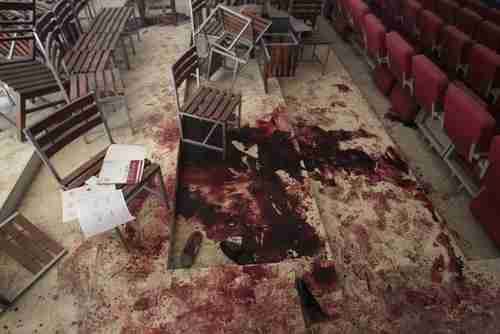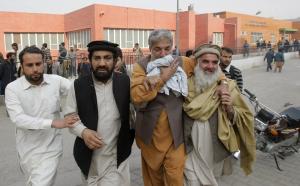This morning’s key headlines from GenerationalDynamics.com
- Pakistan declares no more ‘good’ and ‘bad’ Taliban
- Pakistan ends moratorium on hanging terrorists
- For the first time, US, Afghanistan and Pakistan will cooperate against Taliban
Pakistan declares no more ‘good’ and ‘bad’ Taliban

Shoes lie in blood in aftermath of Peshawar school massacre (Reuters)
After Tuesday’s horrific attack on a Peshawar army school in northwest Pakistan, killing over 130 schoolchildren, Pakistan is essentially declaring war on the Taliban.
The Taliban are not viewed monolithically in Pakistan, as they are in the West. Pakistan’s army and the public generally approve of the Afghan Taliban, which attack American and NATO-allied targets in Afghanistan, including Afghanistan’s government. And they also generally approve of the Punjabi Taliban, which attack India-linked targets, usually in Kashmir. That’s why the first remarks by Pakistan’s prime minister Nawaz Sharif, following the massacre, referred only to “terrorist” perpetrators, not to the Taliban.
By Wednesday, Pakistanis were beginning to refer to the attack as “Pakistan’s 9/11,” and were calling for a full-scale attack on the Taliban. According to Sharif:
We announce that there will be no differentiation between ‘good’ and ‘bad’ Taliban, and resolve to continue the war against terrorism till the last terrorist is eliminated.
We have decided that all parliamentary and political leaders will form a national consensus to defeat terrorism. We have decided to draft an action plan against terrorists and act upon it immediately.
He added that “the entire region (of South Asia) should be cleaned of terrorism,” and indicated that the army will conduct a massive counter-terrorism operation in the tribal area along the border with Afghanistan.
Pakistan ends moratorium on hanging terrorists
He also announced an ending to the moratorium on the death sentence. The moratorium had been adopted in 2012 in the hope of a negotiated peace with the Taliban. Pakistan has one of the largest death row populations in the world, with more than 8,000 prisoners awaiting hanging.
Pakistan hanged two convicted militants Friday in the country’s first executions in years, while warplanes and ground forces pounded insurgent hideouts in a northwest region bordering Afghanistan. So far, 150-200 militants have been killed in the counter-terror operation announced on Wednesday.
However, the United Nations human rights office issued a statement on Friday asking Pakistan to refrain from hangings, saying that they would not stop terrorism and might even feed a “cycle of revenge.”
The Taliban have announced that the reason that they attacked army schoolchildren was in revenge for previous army attacks on Taliban hideouts, which their own wives and children. They promised more attacks on schools, and they also promised revenge for the two hangings.
According to Pakistan’s foreign minister, “This has shaken the entire Pakistani society to the core, and in many ways it’s a threshold in our strategy for countering terrorism.” India Times and Asian Age and The Nation (Pakistan)
For the first time, US, Afghanistan and Pakistan will cooperate against Taliban
For the first time, Pakistan has agreed to cooperate with Afghan, US and coalition forces in Afghanistan in a joint operation against the Taliban on both sides of the border.
One of the peculiarities of most of the last year or two has been that the Pakistani Taliban has been headquartered in Afghanistan, while the Afghan Taliban has been headquartered in Pakistan. This was convenient for both terror groups, because each side could conduct massacres and terror attacks and then flee across the border to the other side, thus escaping the security forces pursuing them.
Part of the new agreement still forbids “hot pursuit” of fleeing Taliban militants across the border in either direction, as that would breach Pakistan’s or Afghanistan’s sovereignty. However, the intention is that both the Pak and Afghan armies would cooperate in an anti-Taliban operation, so in theory the Taliban would not be able to escape by crossing the border. (“In theory, theory and practice are the same. In practice, they are not.” — Albert Einstein.)
The agreement also provides additional open Pakistani approval of American drone strikes targeting Taliban officials in the tribal area. A drone strike on Saturday ago killed five militants in North Waziristan.
However, in a sign that the era of cooperation may not last, former prime minister Pervez Musharraf rose from political death long enough to blame Afghanistan and India for ordering the attack on the Peshawar school. Daily Times (Pakistan) and The National (UAE) and Dawn (Pakistan)
KEYS: Generational Dynamics, Pakistan, Peshawar, Taliban, India, Afghanistan
Permanent web link to this article
Receive daily World View columns by e-mail

COMMENTS
Please let us know if you're having issues with commenting.